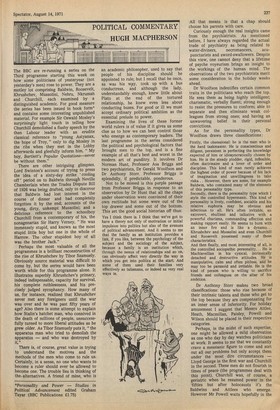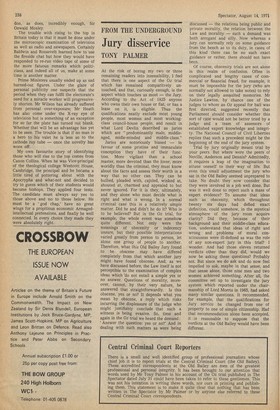The BBC are re-running a series on the Third programme
starting this week on how some politicians of yesteryear (not yesterday's men) rose to power. They are a motley lot comprising Baldwin, Roosevelt, Khrushchev, Mussolini, Nehru, Nkrumah and Churchill, each examined by a distinguished academic. For good measure the series has been issued in book form* and contains some interesting unpublished material. For example Sir Oswald Mosley's surprisingly light touch in telling how Churchill demolished a flashy speech by the then Labour leader with an erudite classical reference to "young Astyanax, the hope of Troy," only to dig Mosley in the ribs when they met in the Lobby afterwards and gleefully inform him, " My boy, Bartlett's Popular Quotations—never be without them."
There are other intriguing glimpses. Lord Swinton's account of trying to press the idea of a sixty-day strike 'cooling off' period on to Baldwin through Neville Chamberlain when the Trades Dispute Bill of 1926 was being drafted, only to discover that Baldwin had lost interest in the course of dinner and had completely forgotten it by the end; accounts of the young, dirty, unkempt Mussolini; and a delicious reference to the schoolboy Churchill from a contemporary of his, the nonagenarian Sir Harry Verney, "He was immensely stupid, and known as the most stupid little boy but one in the whole of Harrow. The other stupidest boy of all was the brother Jack."
Perhaps the most valuable of all the programmes is a brilliant reconstruction of the rise of Khrushchev by Tibor Szamuely. Obviously source material was difficult to come by, but the series would have been worth while for this programme alone. It illustrates superbly Khrushchev's primary, Indeed indispensable, capacity for survival, his complete ruthlessness, and his precisely judged sycophancy. How many of us, for instance, realized that Khrushchev never met any foreigners until the war was over and he was past fifty years of age? Also there is some attempt to explain how Stalin's hatchet man, who connived in the death of millions of people, unsuccessfully turned to more liberal attitudes as he grew older. As Tibor Szamuely puts it, "the apparatus man who tried to demolish the apparatus — and who was destroyed by it."
There is, of course, great value in trying to understand the motives and the methods of the men who come to rule us. Certainly, in a sense, no one who wants to become a ruler should ever be allowed to become one. The trouble lies in thinking of the alternatives. A friend of mine, who is an academic philosopher, used to say that people of his discipline should be appointed to rule; but I recall that he once, as was his w;ty, took up with a bus conductress, and although • the lady, understandably enough, knew little about Plato at the end of the tortured relationship, he knew even less about conducting buses. For good or ill we must accept ordinary political ambition as the essential prelude to power.
Examining the lives of these former world rulers is of value if it gives us some clue as to how we can best control those who emerge as contemporary leaders. The last programme in the series considered the political and psychological factors that brought men to the top, and is a fine example of all that's best and worst in the modern art of punditry. It involves Dr Norman Hunt, Professor Asa Briggs and two psychiatrists, Dr Gerald Woolf son and Dr Anthony Storr. Professor Briggs is splendidly, if predictable, ponderous.
Not to be missed is this purple passage from Professor Briggs in response to an observation by Dr Hunt that all the chaps under observation were convinced of their own rectitude but some were out of the top drawer and some out of the bottom. This set the good social historian off thus: Yes I think there is. I think that we've got to have a theory not only of motivation or initial impulsion into politics but also of the avenues of political advancement. And it seems to me that the family as an institution provides a link, if you like, between the psychology of the subject and the sociology of the subject, because a family is an institution which, through the nexus of relationships and so on, can obviously affect very directly the way in which you get into politics at the start. And some of them used their families very effectively as talismans, or indeed as very real ways in. All that means is that a chap should choose his parents with care.
Curiously enough the real insights came from the psychiatrists. As mentioned before, I have always regarded the actual trade of psychiatry as being related to water-diviners, necromancers, acupuncturists and sword-swallowers. Despite this view, one cannot deny that a lifetime of psyche voyeurism brings an insight to the workings of the human mind. The observations of the two psychiatrists merit some consideration in the holiday weeks ahead.
Dr Woolfson indentifies certain common traits in the politicians who reach the top. He sees them as being highly intelligent; charismatic, verbally fluent; strong enough to resist the pressures to conform; able to separate and then eliminate weak colleagues from strong ones; and having an unwavering belief in their personal convictions.
As for the personality types, Dr Woolfson draws three classifications :
Firstly, the obsessional: he is the man who is the hard taskmaster. He is conscientious and diligent, persistent in perfecting the knowledge expected of him or idiosyncratically chosen by him. He is the steady plodder, rigid, inflexible, often doctrinaire and a lover of order and discipline. This kind of man rarely achieves the highest order of power because of his lack of imagination and unwillingness to take risks... However, there are some, for example Baldwin, who contained many of the elements of this personality type.
Secondly, there is the personality type which I style the controlled hypermanic. This kind of personality is lively, confident, sociable and his relative euphoria may be obvious and infectious to all. He's often irritable, an extrovert, ebullient and talkative with a powerful charisma, commanding affection and making rapport easily. He seems to burn with an inner fire and is like a dynamo... Khrushchev and Mussolini and even Churchill and Roosevelt possessed many of these characteristics.
And then finally, and most interesting of all, is the controlled sociopathic personality... He is Machiavellian in his cynical, intrinsically detached and destructive attitudes. He is manipulative, calm and often pitiless, and he may too be paranoid and irritable. He is the kind of person who is willing to sacrifice friends and colleagues on the altar of his ambition.
Dr Anthony Storr makes two broad classifications: those who rise because of their intrinsic talents and those who get to the top because they are compensating for an inner sense of inferiority. For holiday amusement I suggest that Messrs Attlee, Heath, Macmillan, Paisley, Powell and Wilson should be placed in their respective categories. Perhaps, in the midst of such expertise, one might be allowed a mild observation as one who day by day watches politicians at work. It seems to me that we constantly crave a messianic figure to come and sort out all our problems but only accept them under the most dire circumstances — Lloyd George in the first war and Churchill in the second. These men do not flourish in times of peace (the programmes deal with this point). Churchill was, of course, a geriatric when he resumed power in the 'fifties but after holocausts it's the Baldwins and Attlees who emerge. However Mr Powell waits hopefully in the
don, as does, incredibly enough, Sir Oswald Mosley.
The trouble with rising to the top in Britain today is that it must be done under the microscopic examination of television as well as radio and newspapers. Certainly Baldwin and Roosevelt learned how to use the fireside chat but how they would have responded to re-run video tape of some of the more fatuous remarks which politicians, and indeed all of us, make at some time is another matter.
Prime Ministers usually ended up as sad burned-out figures. Under the glare of personal publicity one suspects that the period when they can fulfil the electorate's need for a miracle worker will progressively shorten. Mr Wilson has already suffered from personal over-exposure; Mr Heath has also come under the X-ray eye of television but is something of an exception for so far the plate has turned out blank. Whether that will be an advantage has yet to be seen. The trouble is that if no man is a hero to his valet he is less so to the cathode ray tube — once the novelty has worn off.
My own favourite story of identifying those who will rise to the top comes from Canon Collins. When he was Vice-principal of the theological college Westcott House, Cambridge, the principal and he became a little tired of pottering about with the Apocrypha and what-not and decided to try to guess which of their students would become bishops. They applied four tests. The candidate must always say yes to those above and no to those below. He must be a 'god chap,' have no great wings for a propitious economic Armagedintellectual pretensions, and finally be well connected. In every choice they made they were absolutely right.



































 Previous page
Previous page